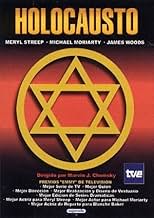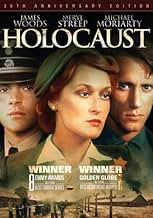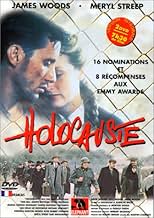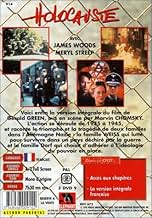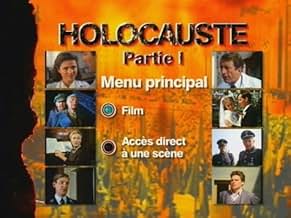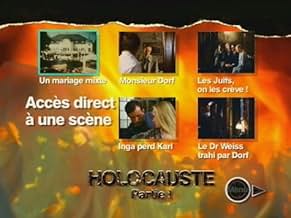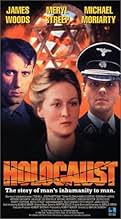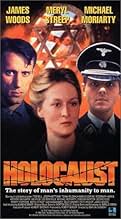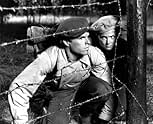La saga de la lutte d'une famille juive pour survivre à l'horreur de la marginalisation et de l'extermination systématiques de leur communauté par l'Allemagne nazie.La saga de la lutte d'une famille juive pour survivre à l'horreur de la marginalisation et de l'extermination systématiques de leur communauté par l'Allemagne nazie.La saga de la lutte d'une famille juive pour survivre à l'horreur de la marginalisation et de l'extermination systématiques de leur communauté par l'Allemagne nazie.
- Récompensé par 8 Primetime Emmys
- 18 victoires et 11 nominations au total
Parcourir les épisodes
Avis à la une
If you were only to see one movie, one television series in your life about the Holocaust (and you should see more), this would be it.
It is the most wide-ranging, most thorough examination of what happened to central and eastern Europe's Jews between 1935 and 1945. The series focuses not on one camp: but on several (Auschwitz, Theresienstadt, Buchenwald, Sobribor - and hear much of Maidenek, Dachau, and others). We see the creation and changes in the ghetto in Warsaw (and hear of the ghettos in Vilnius and elsewhere). We see the evolution in the methods of killing Jews - and why. We see what happened to those deemed defectives at yet another camp.
With two exceptions, I found the acting (by a truly stunning cast - from Nigel Hawthorne to Ian Holm, from James Woods to T.P. McKenna, from Meryl Streep to David Warner, from Rosemary Harris to Sam Wanamaker, from Fritz Weaver to Tovah Feldshuh, Robert Stephens to Deborah Norton, Michael Moriarty) superb - truly moving and powerful. The two exceptions were the daughter Anna and the son Rudy played by Joseph Bottoms. This may not be entirely their fault - their parts are so underwritten - conventional.
The fantastic aspect of this series is its scope - you really do have a grounding in the Holocaust that would serve you well reading any history, seeing any movies set in this time.
The downside is that as fine as the acting is, the series is split among the stories of six to eight people over the course of a decade - which inevitably limits how moved the audience is by the story of each. Thus, in contrast to say, Schindler's List or The Pianist, we are not living and breathing with one person and what happens to him - we do not know these characters THAT well.
I would also criticize the series as creating such one-sidedly virtuous characters in the victims. We are interested in a character in drama only to the extent that the person seems real and we can therefore wholly identify with this real breathing person. Although we do have some feeling of how James Woods' character is different from say, Joseph Bottoms', it isn't sufficient to move the drama to the greatest heights. Actors don't come better than those in this series - so I think it's really due to the nature of the series - the need to get it all in and move around all the different experiences. This better serves our education, but somewhat reduces the sense of having suffered with each individual.
This was a great and enormously expensive production. It is very worthwhile renting - and should be shown to everyone above say, the age of 12 (I'd say that a younger age is too susceptible to the horror). NBC is to be commended highly for having developed it. It's tremendous.
It is the most wide-ranging, most thorough examination of what happened to central and eastern Europe's Jews between 1935 and 1945. The series focuses not on one camp: but on several (Auschwitz, Theresienstadt, Buchenwald, Sobribor - and hear much of Maidenek, Dachau, and others). We see the creation and changes in the ghetto in Warsaw (and hear of the ghettos in Vilnius and elsewhere). We see the evolution in the methods of killing Jews - and why. We see what happened to those deemed defectives at yet another camp.
With two exceptions, I found the acting (by a truly stunning cast - from Nigel Hawthorne to Ian Holm, from James Woods to T.P. McKenna, from Meryl Streep to David Warner, from Rosemary Harris to Sam Wanamaker, from Fritz Weaver to Tovah Feldshuh, Robert Stephens to Deborah Norton, Michael Moriarty) superb - truly moving and powerful. The two exceptions were the daughter Anna and the son Rudy played by Joseph Bottoms. This may not be entirely their fault - their parts are so underwritten - conventional.
The fantastic aspect of this series is its scope - you really do have a grounding in the Holocaust that would serve you well reading any history, seeing any movies set in this time.
The downside is that as fine as the acting is, the series is split among the stories of six to eight people over the course of a decade - which inevitably limits how moved the audience is by the story of each. Thus, in contrast to say, Schindler's List or The Pianist, we are not living and breathing with one person and what happens to him - we do not know these characters THAT well.
I would also criticize the series as creating such one-sidedly virtuous characters in the victims. We are interested in a character in drama only to the extent that the person seems real and we can therefore wholly identify with this real breathing person. Although we do have some feeling of how James Woods' character is different from say, Joseph Bottoms', it isn't sufficient to move the drama to the greatest heights. Actors don't come better than those in this series - so I think it's really due to the nature of the series - the need to get it all in and move around all the different experiences. This better serves our education, but somewhat reduces the sense of having suffered with each individual.
This was a great and enormously expensive production. It is very worthwhile renting - and should be shown to everyone above say, the age of 12 (I'd say that a younger age is too susceptible to the horror). NBC is to be commended highly for having developed it. It's tremendous.
10smwise3
NBC's Holocaust is perhaps the finest miniseries I've seen on television. I purchased the two VHS set several years ago and watch it at least once a year over several nights. Holocaust features a large, excellent cast, which make up for emotion which they lack in depth. Sadly, the stories are all too familiar and have presented in one form or another, but what makes this series stand out is the fact that it was able to compress time and feature some of the best known events of the holocaust, such as Babi Yar, Sobibor and Warsaw Ghetto, seamlessly. The dual story lines tracking the Jewish Weiss family and the German Dorff family intertwine believably, and the graphic violence is appropriate for this production. Michael Moriarty was excellent as the meek lawyer who became a cold calculator and Rosemary Harris was memorable as the proud but stubborn Berta Weiss. Meryl Streep and James Woods also are noteworthy, and it's a delight to see both actors in early roles. I recall when Holocaust debuted it became a media event and school project, with study guides for classroom discussion. I wonder if some of the material was appropriate for some young audiences.
Reinhart Heydrich is known by historians as having been a uniquely dangerous member of the Hitler's inner circle, as the man was not only far more intelligent than the usual Nazi thug, but completely amoral as well. Both sides are superbly bought out by David Warner as his Heydrich reveals his philosophy to Michael Moriarty's Captain Dorf - it was the high point of the miniseries. It marked Warner for me as a thinking man's villain.
I have read the other comments and was suprised to see a few people thought it was "boring" or not as good as Schindler's List. I actually watched this years ago as a young teen and recall being enthralled because of course other than history class it wasn't widely discussed. I knew more than most because my best friend's father lost his parents in the camps. Certainly it bogged down in parts but there were some superb performances and especially from Micheal Moriarty as a weak man molded by both his wife and his acceptance into the Nazi Party. It turns out oddly enough that Moriarty really is a bit loony. I don't think network TV would have the guts to attempt something as ambitious now and I am not sure that viewer's would be able to pay attention for such a long time. Yes it is flawed but I would implore anybody to watch it.
Hindsight's wonderful, and it easy now to criticise this series. I saw it first in Germany and the effect it had there was quite profound. It caused a national debate and, it could be argued, helped Germany face up to what occurred between 1933 and 1945, not so much from the extermination camps, but that they, a civilised people, could be led along that path.
Le saviez-vous
- AnecdotesThe term "Holocaust" didn't exist in the German language until the 1980s. Due to the great success of this mini-series, it became common knowledge, and was chosen as "word of the year 1979" by the "Gesellschaft für deutsche Sprache" (Society for German Language).
- Citations
Moses Weiss: I have the right name but I'm afraid I can't lead you to the promised land.
- Versions alternativesPolish authorities protested against a scene in which soldiers dressed in Polish uniforms executed Jewish prisoners. The poles didn't have any "Quisling army" during the war. The scene was trimmed and now shows the rifles and the arms of the soldiers in question. Even so, both versions apparently remained in circulation as Danish TV originally showed the original version, and Swedish TV the trimmed version within weeks of each other.
- ConnexionsFeatured in The 30th Annual Primetime Emmy Awards (1978)
Meilleurs choix
Connectez-vous pour évaluer et suivre la liste de favoris afin de recevoir des recommandations personnalisées
- How many seasons does Holocaust have?Alimenté par Alexa
Détails
Contribuer à cette page
Suggérer une modification ou ajouter du contenu manquant


